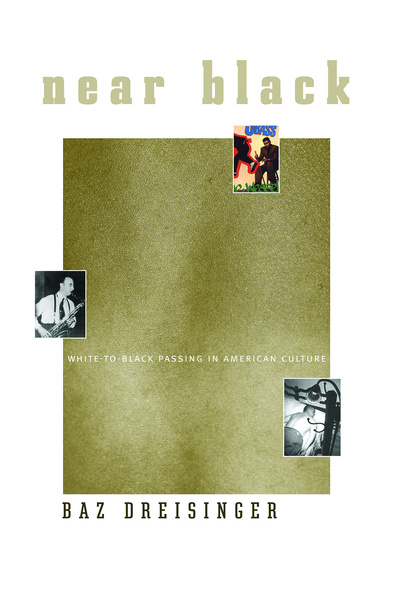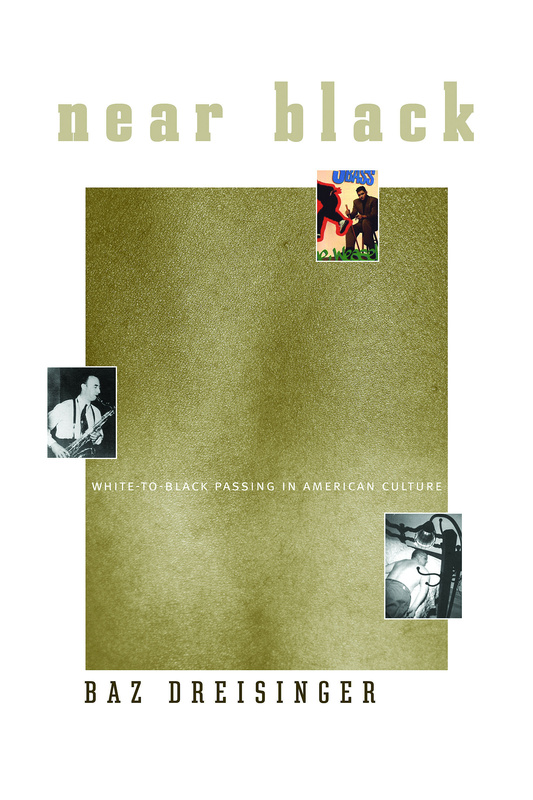Near Black
White-to-Black Passing in American Culture
University of Massachusetts Press
In the United States, the notion of racial "passing" is usually associated with blacks and other minorities who seek to present themselves as part of the white majority. Yet as Baz Dreisinger demonstrates in this fascinating study, another form of this phenomenon also occurs, if less frequently, in American culture: cases in which legally white individuals are imagined, by themselves or by others, as passing for black.
In Near Black, Dreisinger explores the oft-ignored history of what she calls "reverse racial passing" by looking at a broad spectrum of short stories, novels, films, autobiographies, and pop-culture discourse that depict whites passing for black. The protagonists of these narratives, she shows, span centuries and cross contexts, from slavery to civil rights, jazz to rock to hip-hop. Tracing their role from the 1830s to the present day, Dreisinger argues that central to the enterprise of reverse passing are ideas about proximity. Because "blackness," so to speak, is imagined as transmittable, proximity to blackness is invested with the power to turn whites black: those who are literally "near black" become metaphorically "near black."
While this concept first arose during Reconstruction in the context of white anxieties about miscegenation, it was revised by later white passers for whom proximity to blackness became an authenticating badge. As Dreisinger shows, some white-to-black passers pass via self-identification. Jazz musician Mezz Mezzrow, for example, claimed that living among blacks and playing jazz had literally darkened his skin. Others are taken for black by a given community for a period of time. This was the experience of Jewish critic Waldo Frank during his travels with Jean Toomer, as well as that of disc jockey Hoss Allen, master of R&B slang at Nashville's famed WLAC radio. For journalists John Howard Griffin and Grace Halsell, passing was a deliberate and fleeting experiment, while for Mark Twain's fictional white slave in Pudd'nhead Wilson, it is a near-permanent and accidental occurrence.
Whether understood as a function of proximity or behavior, skin color or cultural heritage, self-definition or the perception of others, what all these variants of "reverse passing" demonstrate, according to Dreisinger, is that the lines defining racial identity in American culture are not only blurred but subject to change.
In Near Black, Dreisinger explores the oft-ignored history of what she calls "reverse racial passing" by looking at a broad spectrum of short stories, novels, films, autobiographies, and pop-culture discourse that depict whites passing for black. The protagonists of these narratives, she shows, span centuries and cross contexts, from slavery to civil rights, jazz to rock to hip-hop. Tracing their role from the 1830s to the present day, Dreisinger argues that central to the enterprise of reverse passing are ideas about proximity. Because "blackness," so to speak, is imagined as transmittable, proximity to blackness is invested with the power to turn whites black: those who are literally "near black" become metaphorically "near black."
While this concept first arose during Reconstruction in the context of white anxieties about miscegenation, it was revised by later white passers for whom proximity to blackness became an authenticating badge. As Dreisinger shows, some white-to-black passers pass via self-identification. Jazz musician Mezz Mezzrow, for example, claimed that living among blacks and playing jazz had literally darkened his skin. Others are taken for black by a given community for a period of time. This was the experience of Jewish critic Waldo Frank during his travels with Jean Toomer, as well as that of disc jockey Hoss Allen, master of R&B slang at Nashville's famed WLAC radio. For journalists John Howard Griffin and Grace Halsell, passing was a deliberate and fleeting experiment, while for Mark Twain's fictional white slave in Pudd'nhead Wilson, it is a near-permanent and accidental occurrence.
Whether understood as a function of proximity or behavior, skin color or cultural heritage, self-definition or the perception of others, what all these variants of "reverse passing" demonstrate, according to Dreisinger, is that the lines defining racial identity in American culture are not only blurred but subject to change.
The payoff for the reader...is in the wildly diverse accounts gleaned from the author's assiduous research—New York Times Book Review
'This book is the first of its kind: a study of racial passing focused on whites who pass as black. . . . It successfully collates a host of historical figures and fictional texts both canonical and marginal: the literature of the tragic mulatto, the memoirs of Euro-American jazz musicians living in African American communities, best-selling race-based journalism, contemporary mixed-race narratives, Hollywood films about racial performance, and the love and theft of African American culture.'—Joel Dinerstein, author of Swinging the Machine: Modernity, Technology, and African American Culture between the World Wars
'How black is Eminem? How white is our president? We can't help asking these awkward questions as we digest Near Black by Baz Dreisinger.'—New York Review Of Science Fiction
'A very interesting and provocative book. . . . Scholars of race and American culture(especially popular music) will find much that is valuable here.'—The Journal of American History
'Dreisinger uses white-to-black passing to theorize racial identity in ways that can be helpful in untangling the confusing claims we make about race. . . . Near Black helps reveal the ways racial boundarise are defined, sustained, transgressed, and balanced through the dialectical tension between various racial subjectivities.'—MELUS: Multi-Ethnic Literature in the U.S.
'(Dreisinger) provides a compelling perspective on past and current perceptions of race in American culture.'—Project Muse
'Baz Dreisinger is interested in making cultural geography crucial to undersanding racial formation. The very notion of the color-line, she notes, expresses an understanding of racial distinctions as spatial divisions.'—Journal of African American History
Baz Dreisinger is assistant professor of English at John Jay College of Criminal Justice, City University of New York. Her essays and reviews have appeared in the New York Times, Village Voice, Vibe, Los Angeles Times, and other publications.





